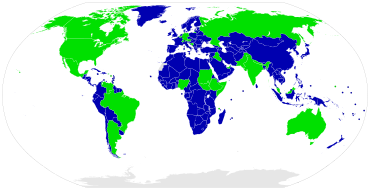
A federated state (also state, province, region, canton, land, governorate, oblast, emirate, or country) is a territorial and constitutional community forming part of a federation.[1] A federated state does not have sovereignty since powers are divided between the other federated states and the federal government. Federated states are different from sovereign states.
Importantly, federated states do not have standing as entities of international law. Instead, the federal union as a single entity is the sovereign state for purposes of international law.[2] Depending on the constitutional structure of a particular federation, a federated state can hold various degrees of legislative, judicial, and administrative jurisdiction over a defined geographic territory and is a form of regional government.
In some cases, a federation is created from the union of political entities that are either independent or dependent territories of another sovereign entity (most commonly a colonial power).[A] In other cases, federated states have been created out of the administrative divisions of previously unitary states.[B] Once a federal constitution is formed, the rules governing the relationship between federal and regional powers become part of the country's constitutional law and not international law.
In countries with federal constitutions, there is a division of power between the central government and the component states. These entities – states, provinces, counties, cantons, Länder, etc. – are partially self-governing and are afforded a degree of constitutionally guaranteed autonomy that varies substantially from one federation to another.[C] Depending on the form the decentralization of powers takes, a federated state's legislative powers may or may not be overruled or vetoed by the federal government. Laws governing the relationship between federal and regional powers can be amended through the national or federal constitution, and, if they exist, state constitutions as well.
In terms of internal politics, federated states can have republican or monarchical forms of government. Those of republican form (federated republics) are usually called states (like states of the US) or republics (like republics in the former USSR).